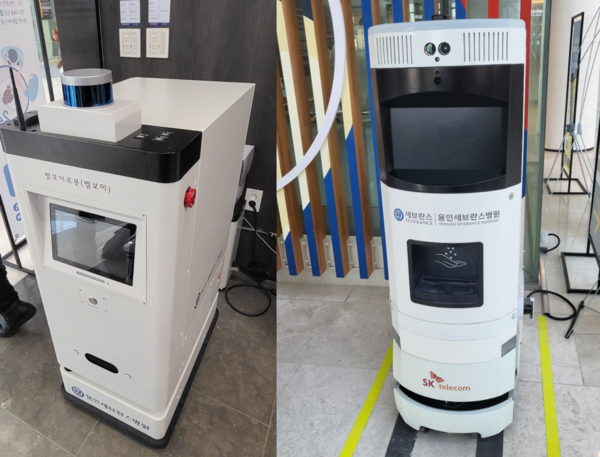Summary
- Robots are assisting frail patients, but current models are creating more work for caregivers than they save.
- AI chatbots are advanced enough to handle receptionist duties in hospitals.
- Robots can deliver medicine, check on welfare, and have been doing surgery for years with increasing precision.
No one likes going to the hospital, but at some point you’ll be in need of medical help or visiting someone in that position. Depending on where you live and your reason for visiting, there’s a good chance you’ll run into a robot of some description at your local hospital soon.
Robots Are Helping the Frail
Caregivers have jobs that are difficult both mentally and physically, but thanks to a class of assistive robots designed to safely lift elderly or otherwise frail patients from their beds or chairs, this particular burden can be eased.
At least, that’s the theory. According to a 2023 MIT review, such robots have failed to take off in Japan, which has been trying to implement such robots for almost a decade in the face of a dwindling youthful population, and the need to care for a growing elderly one. The main reason for this, according to the review, is that the robots end up creating more work for carers than they save, while reducing human contact for the elderly.
That said, AI technology has been coming along by leaps and bounds, and thanks to new hardware and software advancements, we are at the cusp of a robotics revolution that should make robots like these smarter and more independent. So don’t be surprised if you see special support robots assisting patients while also having a lively chat with them over the next few years.
Bots Can Handle Reception Duties Now
If you’ve tried apps like ChatGPT’s advanced voice chat, you know that AI chatbots have advanced to the point where they can understand complex natural spoken language, and reason to some extent. These chatbots have also been embodied in robots like Boston Dynamics’ Spot, so creating a receptionist bot for a hospital, or any business really, isn’t particularly far-fetched.
Of course, Japan’s had a hotel with a “robot” receptionist for years, but humanlike animatronics have advanced a lot in the meantime. Just have a look at Ameca, shown here combined with a now-outdated version of ChatGPT.
Not that a chatbot-powered receptionist needs to be anything this fancy. Just a screen with an animated face would probably get the job done!
Robots Can Deliver Medicine or Check Up on Welfare
There are already robots delivering food and other items at the street level, and within hotel buildings, so don’t be surprised to see transport robots bumbling around hospitals carrying medicine, lab samples, and other supplies and equipment.
One Korean hospital has been using service robots as “guides and porters” since 2020 and includes blood and medicine transfer robots. By having these types of bots take over the busywork that makes up so much of hospital activities, human medical professionals can spend more time tending to patients, or can reduce the amount of mental and physical stress they’re under. Hopefully both!
Robots Have Been Doing Surgery for Years
The first da Vinci surgical robot (by Intuitive Surgical) approved by the FDA saw the light of day in 2000. Since then, da Vinci has created several generations of surgical robots that have allowed human surgeons to perform incredibly delicate surgeries, and even perform them at great distances.
While Intuitive Surgical were pioneers and remain an important player, they now have plenty of competition. Take the Mako knee-surgery robot as an example.
Knee surgery is common, but tricky to get right. A system like the Mako, makes it more likely that the surgery will be a success, and the patient will recover well. Hip surgery is an even bigger hurdle, and the Mako system can assist surgeons in making a hip operation more accurate and efficient.
The Revo-I is a Korean competitor to the da Vinci, which offers similar precision surgery under the control of a skilled surgeon.
AI Is Becoming Crucial to Medicine
Robots are likely to pop up in hospitals, even if it’s just to clean the floors, but these electro-mechanical laborers aren’t worth much if they don’t have the brains to match their brawn. Various AI technology, and AI-specific computer processors, have been bringing exciting new possibilities to the world of medicine.
We’re already seeing AI systems for detecting various types of cancer that can perform as well as or better than trained specialist doctors. Of course, they can’t replace human doctors, but they can bring their attention to something they have missed for verification.
AI-powered diagnostic systems will likely play a large part in medicine going ahead, assisting doctors in finding the most likely diagnosis faster, which means you can get the right treatment sooner. However, robots themselves are benefiting immensely from AI technology developments to help them understand their environments, dynamically solve problems in the physical world, and know the context of what they see and hear.
Robots, and the AI that powers them, are set to change the world of medicine as much as the discovery of antibiotics, or germ theory. So if you next visit a hospital and run into some type of robot, keep in mind that they are literally made to make you healthier.
